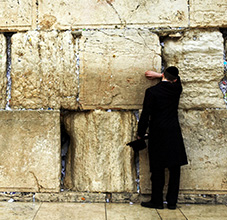Jewish Good News Principles

By Sam Nadler
The Good News is God’s way to restore what sin has destroyed. Jewish tradition has a relevant phrase that communicates this idea: Tikkun Olam, or “repairing the world.” God wants the world restored to His purpose and not merely recreated in our image.
The Triune God created us in His image to rule creation. Today, “ruling” may suggest domination. But pre-sin ruling was a responsibility best seen in Adam’s gardener-training phase by cultivating and keeping, that is, to serve and protect it. The surprise is that in creating Adam in His own image, the Lord then proclaimed that it is not good for man to live alone. We best represent God in loving relationships. These loving relationships are most effectively seen in a caring community – a loving group, not as a lone hermit.
We see in this loving relationship re-emphasized by the command that the Lord gave Adam and Eve to “be fruitful and multiply and fill the earth and subdue it.” From the beginning, “God blessed them,” not just him or her. Adam and Eve were blessed in relationship together. They were created with complete dependence on their Creator to fulfill His will.
However, their impact upon the world as His representatives was not yet a restoration, redemption or salvation issue; it preceded their sin. Our faithful service is to represent God for who He is through His word regardless of the world’s condition. It is only with the catastrophic fall in Genesis 3 that we have Tikkun Olam. The purpose of Tikkun Olam is to restore this sin-ruined world; that is, to restore our severed relationship to God and our divided community with each other. When sin necessitated redemption, God promised a Redeemer from “the seed of the woman.”
God focused the promise through His covenant to give Abraham a land, a people and a blessing, so that in his seed all the nations of the earth would be blessed. The Covenant promises moved Abraham to have a blessed impact on his world. In the midst of pagan Canaan, Abraham “called upon the name of the Lord,” thus applying Tikkun Olam. So also, in representing God, Abraham took disciple-making seriously with the 318 servants (or literally, “dedicated ones,” or chanikav) that “were born in his house.” This community of disciples shared in his urgent Tikkun Olam service.
In the Prophets, Tikkun Olam takes on a national urgency, like a responsible watchman warning the Jewish community of impending judgement. The New Covenant teaches that Yeshua is God’s faithfulness to Israel. The Good News of Messiah is the realization of the promise to our fathers and God’s eternal will for Tikkun Olam. Messiah’s death and resurrection fulfilled God’s Edenic promise, and as Abraham’s ultimate Seed He sent out His disciples to make disciples of all nations. The fulfillment of the promise called us to make disciples from the beginning until He returns. His representatives who value Tikkun Olam impact Olam Hazeh (this world) through Olam Haba’s (the next world’s) Good News proclamation to our people and all people.
Sanctification of The Name
For Paul, the Good News reveals God’s righteousness as he says: For I am not ashamed of the Good News, for it is the power of God to all who believe, to the Jew first and also to the Greek. For in it the righteousness of God is revealed…(Rom. 1:16-17).
Here we must consider a foundational biblical concept called Kiddush HaShem, or Sanctification of the Name. God’s “Name” doesn’t just mean a given name like “Sam,” but it speaks of His character or reputation. Since we were created in God’s image, when we sinned, we brought desecration of His name. But, God’s reputation, His righteous character, must and will remain holy, or set apart.
“You shall not profane My holy Name, but I will be sanctified among the sons of Israel; I am the LORD who sanctifies you” (Lev. 22:32).
Messiah lived and died for Kiddush HaShem, the sanctification of the Name. Even as the ultimate desecration of the Name is our sinfulness, so also the ultimate sanctification of the Name is Yeshua’s sacrifice for our sins.
In traditional Judaism, a righteous martyr makes Kiddush HaShem when he willingly gives up his life rather than commit a grave sin against God’s Name. For example, according to tradition, Rabbi Akiva in 132 AD sanctified the Name when, being tortured to death by the Romans, he refused idolatry and died with the confession of God on his lips. However, the Lord Yeshua went further. Not only did He die rather that tarnish God’s Name by any sinful action, He died so as to reverse and remove our desecration of HaShem (the Name)!
The Good News is only validated as God’s righteousness is revealed. Paul’s theme in Romans is that the Good News of Yeshua reveals God’s righteousness, in other words, His death sanctifies God’s Name.
“Our Father in heaven! May your Name be kept holy!” (Matt. 6:9)
The Jewish Essence of the Good News
The Good News declares what Yeshua has done. In Rom. 1:16-17 this has three essential elements that demonstrate God’s righteousness in Yeshua’s work.
- The Good News is God’s “saving power” in Yeshua. HaShem demanded a consistent righteousness from His people. What He provided in Yeshua’s life, death and resurrection is the work of righteousness, required to restore us to a right standing with our Creator. The Good News of Yeshua is the message of God’s righteous work that powerfully saves, reconciles and restores the lost nations of the world as well as the lost sheep of the house of Israel.
- The Good News is “to all who believe.” Since the Good News is what God has accomplished and provided in Messiah Yeshua, therefore that same message requires appropriation by faith. Salvation by faith in Yeshua demonstrates God’s righteousness for it confirms that what God has done in Messiah is sufficient for His Name’s sake. Just as Abraham believed the same promise and it was accounted to Him for righteousness (Gen. 15:6), so also those who are His children by faith are considered righteous before God!
- The Good News is “to the Jew first (or chiefly), and also to the Gentile.” What about this Good News being the righteousness of God demands it be “to the Jew first”? The covenant with Abraham and his seed is the only hope of the nations. No other covenant of redemption was made with another people. The Good News is always “to the Jew first” because God is always faithful to the Abrahamic promise. God could not righteously save anyone apart from what He promised Israel, as corroborated in Romans 9:11 and “confirmed” in Romans 15:8. The same covenant that promised blessing for the nations in Abraham’s seed also promised Abraham a people and a land. It is one covenant. If God were to fulfill one promise but nullify another, He would break the covenant, therefore being unrighteous with Abraham and his descendants. So also, as we seek to bring honor to God’s Name, let us heed this three-fold Good News which reveals God’s righteousness in Messiah. If we remove any element then we have a different message that defames God’s righteous character. Yeshua is the public demonstration of HaShem’s righteousness first and foremost for the Jewish people. Paul, the Apostle to the Gentiles, expected Gentile believers he raised in the faith to be unashamed and thereby proclaim the Good News to the Jew first. For the sake of Kiddush HaShem, how can we do any less?




Add Comment